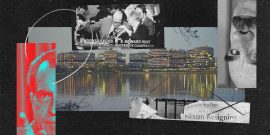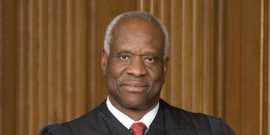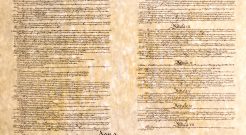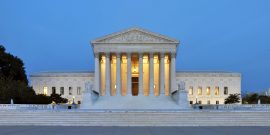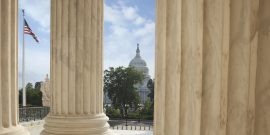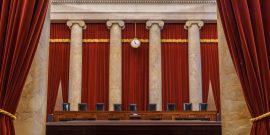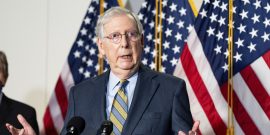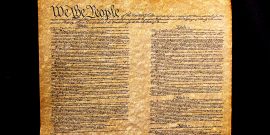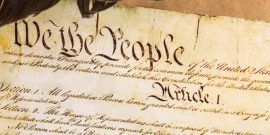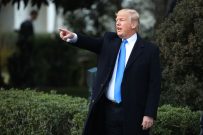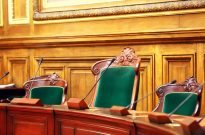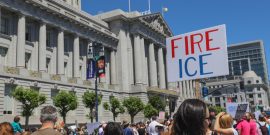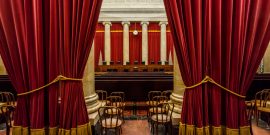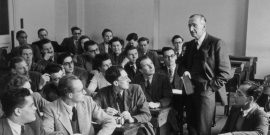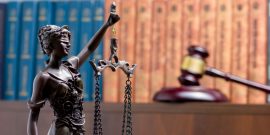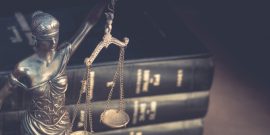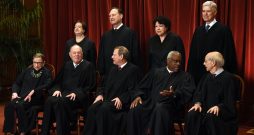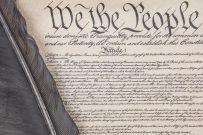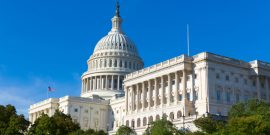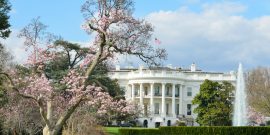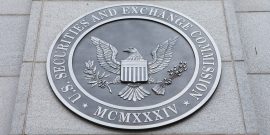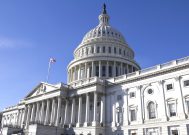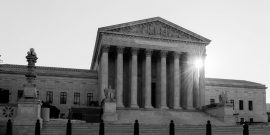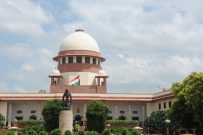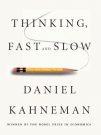Jonathan Gienapp's The Second Creation has exerted wide influence. But it is wrong to suggest the Constitution's meaning was not fixed.
Mike Rappaport
When it comes to restraining executive agencies, traditional interpretive canons could do nearly as well as the MQD without departing from originalism.
What should the Supreme Court’s originalist justices do when confronted with nonoriginalist precedents on which citizens have relied?
Is Trump’s acquittal compared to Nixon’s forced resignation merely the result of the different media environment?
Today’s citizens are capable of making wise additions to the original design so long as they employ the sound constitution-making process of Article V.
An originalist Supreme Court forces the nation into a deliberative mode, requiring compromise and consensus before the Constitution can be changed.
Is Clarence Thomas the greatest originalist justice in the Court's history?
This past year the importance of Supreme Court appointments returned with a vengeance.
If a small number of sellers will not provide a service to persons of certain political views, classical liberalism does not rule out regulation.
The Constitution’s original meaning provides a judicially manageable line between constitutional and unconstitutional delegations.
While Congress can add justices to the Court, it can only do so if its act is “necessary and proper.”
The Senate majority’s power is accepted as legitimate, even when that majority takes highly partisan actions.
If Chiafalo is the best that originalists can do, that is a damning indictment.
Embracing originalism is not the only response that progressives might make to conservative nonoriginalism, but there are reasons to think they might.
The most significant developments in the past year suggest a potent originalist future.
In my view, there is much to be said for an equal rights amendment that has a determinate meaning, but the revived ERA fails to do this.
A proper understanding of the Fourth Amendment can accommodate modern technology, even though that technology was not known at the time.
To determine the content of the common law right in such unclear cases, one must put oneself in the position of a common law judge at the time.
Today the two-thirds provision may be the only thing impeding even more intense partisanship concerning impeachment and removal.
Why is it so hard to define intellectual movements in terms of what unites rather than divides them?
Chief Justice Roberts gets the best of both worlds—the Court narrows Auer, but is not seen as overturning a precedent dear to progressives.
Chevron deference should be replaced with a system that accords weight to both contemporaneous and customary interpretations.
Some conservatives are unhappy with modern originalism; the best path for them is not to abandon it but to promote a more conservative version.
In Gundy v. United States, the Supreme Court wasted the opportunity to restore the Constitution’s prohibition on delegation of legislative power.
Many of the Supreme Court’s decisions as to state sovereign immunity are problematic, but there is an originalist basis for some of those decisions.
If the information of wrongdoing is disclosed to the public, and the public can address it through the ballot box and impeachment, that is enough.
The Constitution’s assignment of the judicial power to Article III judges is a real constraint on government action.
Legal interpretive rules are key to discovering the Constitution’s original meaning.
Regulation often leaves us poorer and less free because it is crafted in a way that disrespects liberty and human judgment.
A new paper enhances our understanding of the Take Care Clause by linking it to the Presidential Oath Clause.
Originalism is not merely a modern movement born in 1982; it is as old as the Constitution.
The Federalist Interpretation of the Ninth Amendment has some merit, but the Amendment still protects natural rights.
The Ninth Amendment recognizes natural rights, but does not protect them as constitutional rights.
The new case of Biestek v. Berryhill may suggest that courts should give more deference to administrative agency factfinding.
The Slaughterhouse Cases were wrong – seriously and grieviously wrong.
We have come a long way since Bork looked at the Privileges or Immunities Clause, and Pulliam could benefit from this scholarship.
While some scholars argue otherwise, the evidence suggests that Chief Justice Marshall was a type of originalist.
Mark Pulliam rightly criticizes nonoriginalist judicial activism but wrongly would depart from the original meaning in other cases.
While people set great store on the Preamble’s “We the People of the United States,” other versions of the Preamble might have had the same effect.
Gouverneur Morris penned the final draft of the Constitution and he changed many of the provisions in important ways.
The Preamble to the Constitution has an important but limited function in constitutional interpretation.
Criticisms about cultural appropriation turn out to be inconsistent with essential aspects of the greatness of a free society.
Requiring people to apply from scratch to get a new license when they move from one state to another is unjustified
It is not income equality, but making the poor better off that is an important value for government policy.
One need not believe that process crimes are unimportant to conclude that they fail to demonstrate wronging in Trump Administration.
Means tested government programs with high implicit marginal tax rates are bad public policy.
Originalist justices need not be understood as deciding cases based on their political party.
Jonathan Gienapp's new book falsely sees the Framers' criticisms of parchment barriers as evidence that the Constitution did not have a fixed meaning.
Instead of closing the government, it could operate at a reduced percentage of the previous year’s spending levels.
While people assume private unemployment insurance was not practical, it was government prohibitions that blocked it from being sold prior to the New Deal.
Superior tax treatment for employer-provided health insurance and retirement benefits is pernicious.
The Constitution’s original meaning allows for precedent, but does not specify the particular precedent rules that should be followed.
Many people defend Chevron as deference for an agency determination of policy, but Chevron actually involves close legal issues.
Lying to a federal agent is a crime, and despite this, the FBI—indefensibly—does not record interviews.
Recusals have played an even more important role in the investigations of Trump than most people realize.
Defenders of Chevron and Auer Deference often ignore agency bias.
George H.W. Bush may have had a great character as an individual, but his character in political office left much to be desired.
President Trump's critics should supply a list of what they regard as his most problematic actions.
Checks and Balances raises important questions, but they need to identify the specific problems with Donald Trump.
Michael Greve is right, it’s time to address the serious infirmities that afflict agency adjudication — but my reform proposal is better.
Original Methods Originalism does not assume a consensus on interpretive methods. The approach works both interpretively and normatively without one.
Can Matthew Whitaker be named as Acting Attorney General when the Attorney General can only be appointed with the advice and consent of the Senate?
Advocates and opponents of birthright citizenship are stuck in a dilemma: originalism binds us to accept it, nonoriginalism offers room to deny it.
There is a strong nonoriginalist argument for reading the 14th Amendment not to confer birthright citizenship, but not much room for originalists to agree.
Even if it is consistent with classical liberal principles to regulate those platforms, is it a good idea?
Although constitutional norms are essential to the functioning of our country, they are under serious attack.
Even assuming that the electoral college is a defect in our democracy, the possibility of third party candidates that spoil elections is a worse problem.
A constitutional obstacle to court packing would be tremendously valuable, but it might have downsides as well.
Objectives in studying the past matter, because there is a difference between the historian's “what the past is telling us” and original meaning.
Listen to the Supreme Court: Judge Kavanaugh’s behavior before the committee is no reason to vote against his confirmation.
The Ford-Kavanaugh controversy raises issues at several levels of analysis, and we should be careful in assessing each on its own terms.
Nonoriginalism does not necessarily protect rights better than the alternatives: Amanda Tyler's new book on habeas corpus in wartime offers a corrective.
The history of how the U.S. Constitution and the Biill of Rights were ratified is more complex (and long-lasting) than most people realize.
Michael Rappaport on how Hayek's use of the Ninth and Fourteenth Amendments supports traditional rights - and originalism.
Hayek was an originalist of a certain sort, one who favored an original meaning based on the words of the Constitution and the enactors' intent.
Why is Sarah Jeong's racism acceptable to the Times?
Justice Kavanaugh would make the greatest difference in relatively non-political cases about executive power.
Justice Oliver Wendell Holmes's dissent in Lochner draws the wrong implications out of pluralism.
Justice Oliver Wendell Holmes' two-paragraph dissent in Lochner v. New York does not grapple with the question: what does the 14th Amendment enact?
Because Janus vs. AFSCME ended public unions' ability to mandate agency fees, do they have to pay back what they accrued from their non-members?
We should give serious thought to reforming the rules governing independent counsels.
In a time where the average age of Supreme Court Justices keeps rising, lifetime appointments may not make sense anymore.
Judge Brett M. Kavanaugh has many years on the bench and has demonstrated himself to be a smart originalist.
Why do Supreme Court justices alone retain the privilege of deciding when they should recuse themselves?
Justice Ginsburg repeatedly expressed her opinions about President Trump, and under similar circumstances any judge would be forced to recuse themselves.
Critics of originalism typically accuse originalist scholars of deploying "law office history," but a look at the scholarship refutes this.
Congress and the States are better judges of what constitutional amendments should exist than the Court.
The tide may be turning on the calumnies of the social justice warriors.
Can procedurally-sound amendments to a constitution be declared unconstitutional?
Like many of the President's critics, Sam Harris seems to be unable to dispassionately assess the present moment.
In the political world, political positions are often taken to be more than “mere starting offers," and no one exemplifies this more than Trump.
Whether the President can pardon himself is not self-evident from the Constitution alone.
Lawsuits against the state or the exclusionary rule itself might be the best path to reining in state officials who violate the Fourth Amendment.
The common law understanding that what judges do is a matter of finding the law is enjoying a welcome return.
Due process requires that every person have their day in court, and because of this a central pillar of the administrative state might be unconstitutional.
Debates among constitutional experts matter because these debates help shape broader opinion.
While the government may have discretion to act outside of the courts, its officers often will not, allowing due process to play out in the courts.
One path to ending the Adminstration's legal troubles would be to change the special counsel regulation, but this poses challenges.
Michael Rappaport and John McGinnis respond to Jessie Merriam: the legal turn does not imply a libertarian bias.
Sam Harris and others offer podcasts for every interest, and this market offers a growing space for discussion and debate.
Will Baude's recent article provides new reasons to defend sovereign immunity, and he does so on originalist grounds.
The fact Justices Thomas and Gorsuch disagree is great development — not only for originalism but for constitutional law generally.
Justice Gorsuch treated due process as part of the language of the law in Sessions v. Dimaya. It’s evidence that the legal turn continues to gather strength.
A constitutional amendment is the best path to overcoming the current gerrymandering stalemate, but Congress needs to want to change.
States are responsible for the nature of elections: without a strong historical argument to the contrary, partisan gerrymandering is constitutional.
Professor Ned Foley argues that the Constitution limits congressional gerrymandering. Why is this?
New York Times v. Sullivan made suing for defamation quite difficult, and this creates new challenges in the age of Twitter Mobs.
The Supreme Court’s doctrine of expansive federal power is much weaker than the original meaning of limited government.
The 1970s had the preferable culture, but the 1980s had the better politics.
The importance of Free Enterprise Fund will be felt for years to come because it heralds the return of separation of powers.
We argue that the U.S. Constitution was written in the language of the law, and that treating it as a legal document strengthens originalism.
The Supreme Court should have made members of the SEC subject to presidential removal, and this failure is the central mistake of Free Enterprise Fund.
Eight years on, the Supreme Court's revival of the president's removal power in Free Enterprise Fund v. PCAOB offers important lessons for originalism.
Gillian Metzger argues that the administrative state is constitutionally required, an argument possible only if you ignore original meaning.
Defenders of liberty need to find new ways to restrain government's regulatory power, and supermajority rules are a path to doing this.
Corpus linguistics studies how we actually use words, and this makes it a valuable asset for originalism.
Moving back towards nondelegation is essential if we want to curb arbitrary government power.
Administrative law judges might be unconstitutional under the separation of powers because they should be subject to presidentially controlled removal.
Administrative law judges (ALJs) should be viewed as officers of the United States and Congress has a right to impose certain restrictions on them.
Administrative law judges threaten the separation of powers, yet the alternatives available for changing the law are fraught with dangers.
Is it an indictment of originalism that most originalists in the academy are white males?
Republican nominees have often been disappointments for originalists, but Neil Gorsuch is turning out to be the exception to this trend.
This weekend the Center for the Study of Constitutional Originalism will be holding its Ninth Annual Originalism Works-in-Progress Conference.
Problematic lawmaking drives out orthodox or legitimate lawmaking: Gresham's Law applies in legislation, too.
The House Intelligence Memo shows that the FBI needs greater scrutiny, but so do FISA courts.
The House Intel Memo ignores more scandal than it proves, and it reveals only a small part of the investigative misconduct at play surrounding the election.
Moderating the power of the administrative state means giving power back to Congress and eliminating judicial deference.
In cutting by half the funding to Palestinian refugees, President Trump has made a significant action that other Republican Presidents did not.
While it would be good to address the government shutdown problem alone, it would be better to do so in a way that promotes less spending.
Interpreting the law with original meaning in mind leaves a range of options for defending Brown v. Board.
Originalists can and do support Brown v. Board, and it's important to understand why.
The ACS has compelling reasons to present a united progressive front, but this comes at a steep cost.
Skidmore deference purports to be about recognizing expertise, but it operates to confer an advantage on agencies.
Chevron and Auer undermine the rule of law.
We need a system of administrative law courts that are independent from bureaucratic control.
The REINS Act puts separation of powers principles into the administrative state.
Can we instill classical liberal principles in administrative law?
Progressive faith in government ignores the abuses of power that people with power commit.
Fourth Amendment rights could be better protected through certain actions by state governments and private agreements.
Striking an agreement with your cell phone company could increase privacy protections for your records.
A new wrinkle on the protection of customer identification and cell phone records.
The Carpenter v. United States case, which was argued before the Supreme Court earlier this week, may turn out to be one of the most important Fourth Amendment cases.
The arbitrariness of Cass Sunstein's approach to constitutional interpretation weakens his critique of originalism.
What is the relationship between these documents, especially for interpreting the Constitution?
As an academic, I have worked in various fields, but my dominant passion has been the libertarian pursuit of free markets and freedom under the law. In recent years, I have focused mainly on constitutional originalism. At the University of San Diego, I am the Director of the Center for the Study of Constitutionalism and have a book coming out next year from Harvard, Originalism and the Good Constitution (co-authored with John McGinnis), which presents a new defense of originalism.
The national convention method for proposing and ratifying amendments has never been used to amend the Constitution. Its reliance on two-thirds of state legislatures to apply for a national convention to consider a particular amendment has led to an almost universal fear of a runaway convention that would propose wholesale revisions to the Constitution. In this opening installment of the Liberty Forum, Michael Rappaport engages these considerations and urges a rehabilitation of the national convention model.
Professor Rappaport is Darling Foundation Professor of Law at the University of San Diego, where he also serves as the Director of the Center for the Study of Constitutional Originalism. Professor Rappaport is the author of numerous law review articles in journals such as the Yale Law Journal, the Virginia Law Review, the Georgetown Law Review, and the University of Pennsylvania Law Review. His book, Originalism and the Good Constitution, which is coauthored with John McGinnis, was published by the Harvard University Press in 2013. Professor Rappaport is a graduate of the Yale Law School, where he received a JD and a DCL (Law and Political Theory).



